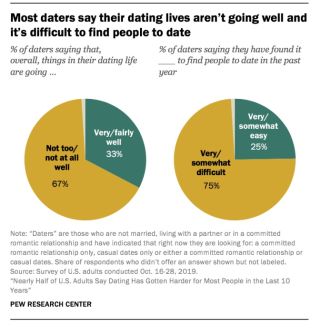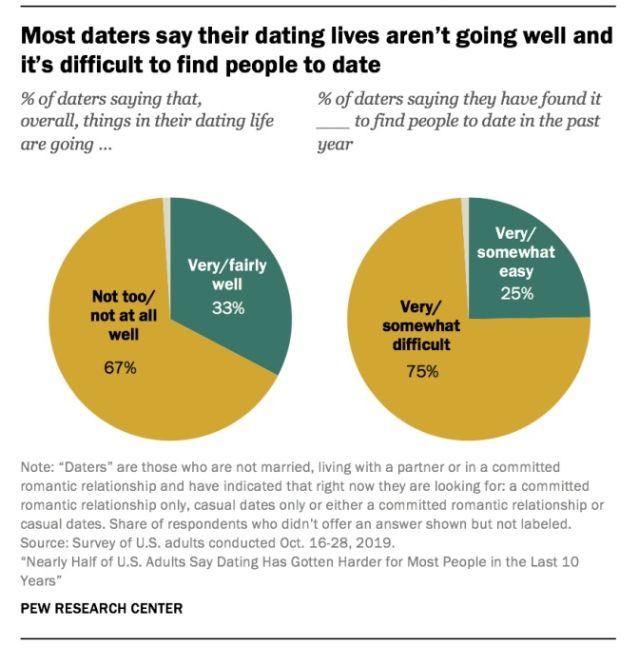Mating
Learning How to Make the Most of Dating
Dating: What is it good for?
Posted December 12, 2023 Reviewed by Abigail Fagan
Key points
- Most men and women believe that dating is difficult and are dissatisfied with their dating life.
- Both men and women struggle to find someone who lives up to their standards and shares their goals.
- A simple strategy to shift the odds in your favor is to ask what the other person is looking for.

The raw, unfiltered experience of dating for many men and women is so frustratingly bad that it ought to come with a warning label. Something along the lines of "Caution, engaging in this activity is known to increase the risk of extreme frustration, disillusionment, and self-doubt."
The ubiquity of dating dissatisfaction is at odds with the common romantic notion of the carefree life of a single person exploring a variety of intriguing romantic interests. It turns out that the reality of dating is often disappointing compared to the fantasy of dating.
A recent study by Pew Research revealed that approximately two-thirds of respondents were unhappy with their dating life. Not surprisingly, nearly three of four respondents also reported it being "somewhat difficult" or "very difficult" to find dates.

At an even more granular level a third of men, and over one-half of women, said it was hard to find someone who even met their standards.
In light of these dreary statistics, it is surprising that so many men and women continue to date. Surely these folks could find more rewarding ways to use their money, time, and emotional energies. Alternatives such as Polka dancing, learning to play the accordion, and stamp collecting come to mind as providing a bigger ROI.
A Solution: Weeding Out the Deadwood
What solutions are there for men and women who wish to date, but don't want to deal with the frustration and headaches that so frequently attach themselves to this endeavor?
As is often the case with solutions, one of the best things you can do is start with the basics. Only date those people who share your goals for dating. If you are looking to build a long-term relationship with someone, for example, you would do well not to date someone who is simply dating for companionship and entertainment. That's a recipe for conflict down the road.
Of course, there are many reasons that men and women wish to date and this means you may find that some of your dating goals overlap, and some do not. If you know what goals are most important to you, however, some disparity between you and your date will not be a problem. As long as your major goals overlap, you can feel comfortable that you are a good fit in this regard.
Knowing what your goal is will take some thought. But this is well worth the effort. Just think of the time and energy you would expend on dating someone for a month or two. If your goals don't align then your time/effort is wasted.
Do your due diligence ahead of time, figure out what you are hoping to achieve by dating and use this as a guide for selecting dates.
Having this goal in mind also helps you avoid becoming deeply involved in a relationship that will ultimately be unsatisfying. Knowing why you are dating gives you some clarity in deciding if the date you went on was a success and should be followed up by future engagements.
For example, if you're looking for a long-term relationship and you discover that your date is extremely exciting, adventurous, attentive, and in no way interested in commitment, you'll likely pass on the opportunity to see them again. If what you are looking for is simply a 'good time', you will very likely look forward to another date.
But how can you determine what it is that someone else, a potential date, wants out of dating? That is, how can you determine if someone shares similar goals for dating?
The answer is surprisingly simple. On a first date (or sooner) tell the other person what you want out of dating and ask what it is that he or she desires.
I can hear a potential response: “That is so uncool. I would sound like a weirdo.”
And my reply is, “So what?”
Is your time and company of so little value that it doesn’t deserve to be protected by a simple question?
The statement of your goals, and question about the other person’s goals, simply makes clear your reasons for dating while at the same time attempting to find out if these goals are shared. Knowing the answer to this question will save everyone involved a great deal of time and possibly some heartache as well.
What’s more, if you do end up deciding to go on a date with that person you'll immediately be in a good position, at the end of the evening, to decide whether it makes sense to go on a second date.
For example, perhaps you learn on the first date that the person you are with is dating for the purpose of finding a spouse. If that is not also your purpose (because you are determined to remain single throughout life), would it make sense to continue to go out with this individual?
The answer of course is a resounding “No.”
I know of no other activity wherein men and women pour so much time and emotional capital into someone else without first determining whether that person shares the goal upon which these efforts are based. Being aware of whether the other person’s motives align with your own should be one of the first steps you make toward crafting a more rewarding dating life.
Of course, it doesn’t end there. You’ll still need to find ways to meet people who have similar values, those to whom you have a physical attraction, and so forth. But by making your dating goals clear from the start you will weed out many people that never should have taken up your time or emotional energies.
References
1 PEW RESEARCH CENTER AUGUST 20, 2020, Nearly Half of U.S. Adults Say Dating Has Gotten Harder for Most People in the Last 10 Years




